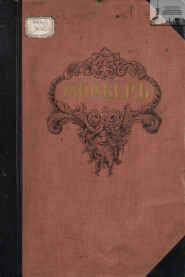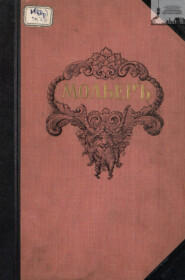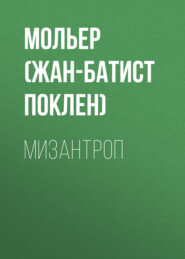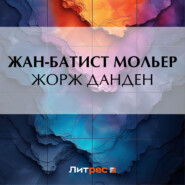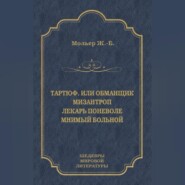По всем вопросам обращайтесь на: info@litportal.ru
(©) 2003-2025.
✖
The Shopkeeper Turned Gentleman
Год написания книги
2017
Настройки чтения
Размер шрифта
Высота строк
Поля
MR. JOUR. No, none of that. I am devilishly hot-tempered, and, morality or no morality, I like to give full vent to my anger whenever I have a mind to it.
PROF. PHIL. Would you like to learn physics?
MR. JOUR. And what have physics to say for themselves?
PROF. PHIL. Physics are that science which explains the principles of natural things and the properties of bodies, which discourses of the nature of the elements, of metals, minerals, stones, plants, and animals; which teaches us the cause of all the meteors, the rainbow, the ignis fatuus, comets, lightning, thunder, thunderbolts, rain, snow, hail, wind, and whirlwinds.
MR. JOUR. There is too much hullaballoo in all that; too much riot and rumpus.
PROF. PHIL. What would you have me teach you then?
MR. JOUR. Teach me spelling.
PROF. PHIL. Very good.
MR. JOUR. Afterwards you will teach me the almanac, so that I may know when there is a moon, and when there isn't one.
PROF. PHIL. Be it so. In order to give a right interpretation to your thought, and to treat this matter philosophically, we must begin, according to the order of things, with an exact knowledge of the nature of the letters, and the different way in which each is pronounced. And on this head I have to tell you that letters are divided into vowels, so called because they express the voice, and into consonants, so called because they are sounded with the vowels, and only mark the different articulations of the voice. There are five vowels or voices, a, e, i, o, u. [Footnote: It is scarcely necessary to say that this description, such as it is, only applies to the French vowels as they are pronounced in pâte, thé, ici, côté, du respectively.]
MR. JOUR. I understand all that.
PROF. PHIL. The vowel a is formed by opening the mouth very wide; a.
MR. JOUR. A, a; yes.
PROF. PHIL. The vowel e is formed by drawing the lower jaw a little nearer to the upper; a, e.
MR. JOUR. A, e; a, e; to be sure. Ah! how beautiful that is!
PROF. PHIL. And the vowel i by bringing the jaws still closer to one another, and stretching the two corners of the mouth towards the ears; a, e, i.
MR. JOUR. A, e, i, i, i, i. Quite true. Long live science!
PROF. PHIL. The vowel o is formed by opening the jaws, and drawing in the lips at the two corners, the upper and the lower; o.
MR. JOUR. O, o. Nothing can be more correct; a, e, i, o, i, o. It is admirable! I, o, i, o.
PROF. PHIL. The opening of the mouth exactly makes a little circle, which resembles an o.
MR. JOUR. O, o, o. You are right. O! Ah! what a fine thing it is to know something!
PROF. PHIL. The vowel u is formed by bringing the teeth near each other without entirely joining them, and thrusting out both the lips whilst also bringing them near together without quite joining them; u.
MR. JOUR. U, u. There is nothing more true; u.
PROF. PHIL. Your two lips lengthen as if you were pouting; so that, if you wish to make a grimace at anybody, and to laugh at him, you have only to u him.
MR. JOUR. U, u. It's true. Oh! that I had studied when I was younger, so as to know all this.
PROF. PHIL. To-morrow we will speak of the other letters, which are the consonants.
MR. JOUR. Is there anything as curious in them as in these?
PROF. PHIL. Certainly. For instance, the consonant d is pronounced by striking the tip of the tongue above the upper teeth; da.
MR. JOUR. Da, da. [Footnote: Untranslatable. Dada equals "cock-horse" in nursery language] Yes. Ah! what beautiful things, what beautiful things!
PROF. PHIL. The f, by pressing the upper teeth upon the lower lip; fa.
MR. JOUR. Fa, fa. 'Tis the truth. Ah! my father and my mother, how angry I feel with you!
PROF. PHIL. And the r, by carrying the tip of the tongue up to the roof of the palate, so that, being grazed by the air which comes out with force, it yields to it, and, returning to the same place, causes a sort of tremour; r, ra.
MR. JOUR. R-r-ra; r-r-r-r-r-ra. That's true. Ah! what a clever man you are, and what time I have lost. R-r-ra.
PROF. PHIL. I will thoroughly explain all these curiosities to you.
MR. JOUR. Pray do. And now I want to entrust you with a great secret. I am in love with a lady of quality, and I should be glad if you would help me to write something to her in a short letter which I mean to drop at her feet.
PROF. PHIL. Very well.
MR. JOUR. That will be gallant; will it not?
PROF. PHIL. Undoubtedly. Is it verse you wish to write to her?
MR. JOUR. Oh no; not verse.
PROF. PHIL. You only wish for prose?
MR. JOUR. No. I wish for neither verse nor prose.
PROF. PHIL. It must be one or the other.
MR. JOUR. Why?
PROF. PHIL. Because, Sir, there is nothing by which we can express ourselves except prose or verse.
MR. JOUR. There is nothing but prose or verse?
PROF. PHIL. No, Sir. Whatever is not prose is verse; and whatever is not verse is prose.
MR. JOUR. And when we speak, what is that, then?
PROF. PHIL. Prose.
MR. JOUR. What! When I say, "Nicole, bring me my slippers, and give me my night-cap," is that prose?
PROF. PHIL. Yes, Sir.







